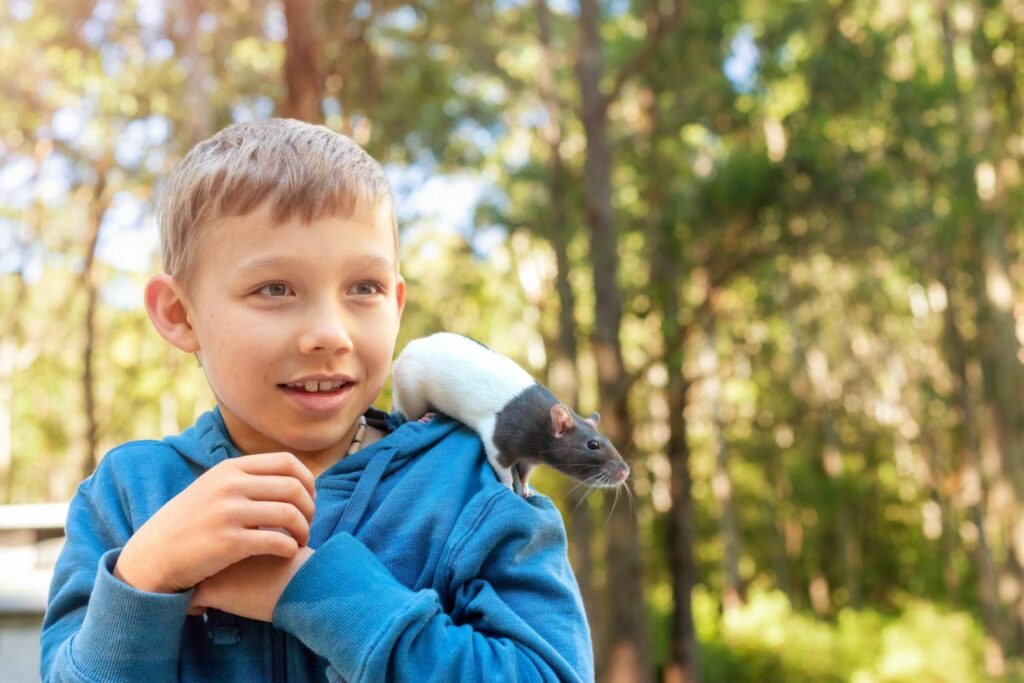Rats are often misunderstood pets. They are intelligent, social, and affectionate animals that can make wonderful companions.
However, they can also be quite shy and timid, making it a challenge for new rat owners to bond with them. In this blog post, I will share my personal experience with pet rats to help you successfully tame your new friend.

Introduction to Taming Rats
Taming your rat is a process that requires patience and dedication. It is important to remember that rats are social creatures and need interaction with their owners to thrive. Taming your rat will not only strengthen your bond with them but also make them more comfortable around you.
Habitat Requirements for Your Pet Rat
Before you start taming your rat, it is important to ensure that their habitat is suitable for them. Rats need a cage that is large enough for them to move around freely, with plenty of toys and accessories to keep them entertained.
Make sure that their cage is clean and well-maintained, with fresh food and water available at all times.
Understanding Your Rat’s Body Language
Rats communicate through body language, and it is important to understand what your rat is trying to tell you. For example, if your rat is bruxing (grinding their teeth), it usually means that they are happy and content.
On the other hand, if they are puffing up their fur, it could be a sign of fear or anxiety. By paying attention to your rat’s body language, you can better understand their feelings and respond accordingly.
Steps to Taming Your Rat
Bonding with Your Rat
The first step in taming your rat is to build a bond with them. Spend time with your rat every day, talking to them, and offering them treats.
Avoid making sudden movements or loud noises that could startle them. Let your rat come to you at their own pace, and avoid forcing them to interact if they are not ready.
Teaching Your Rat Tricks
Once your rat is comfortable around you, you can start teaching them tricks. Rats are intelligent animals and can learn a variety of tricks, from simple commands like “come” and “stay” to more complex behaviors like jumping through hoops.
Use positive reinforcement to reward your rat for their efforts, such as offering them a treat or praising them with a gentle pat.
Common Problems and How to Overcome Them
Biting or Aggressive Behavior
If your rat is exhibiting biting or aggressive behavior, it could be a sign of fear or stress. Take a step back and give your rat some space to calm down.
Try to identify the source of their fear or stress and remove it if possible. Gradually reintroduce your rat to the situation, using positive reinforcement to encourage calm and relaxed behavior.
Shyness or Fearful Behavior
If your rat is shy or fearful, it is important to be patient and gentle with them. Spend time with your rat every day, offering them treats and talking to them in a soothing voice.
Avoid making sudden movements or loud noises that could startle them. Offer them a cozy hiding spot in their cage where they can retreat if they feel overwhelmed.
Maintaining the Bond with Your Rat
Taming your rat is an ongoing process, and it is important to maintain your bond with them. Spend time with your rat every day, offering them treats and talking to them in a soothing voice. Play with them and continue to teach them new tricks.
Make sure that their habitat is clean and well-maintained, with fresh food and water available at all times.
Conclusion
Taming your pet rat is a rewarding experience that can strengthen your bond with your pet and provide endless hours of entertainment.
By following these steps and being patient and gentle with your rat, you can build a happy and healthy relationship with your furry friend. Remember to always listen to your rat’s needs and respond accordingly, and you will have a loving and loyal companion for years to come.
- How Long Do American Eskimo Dogs Live? Important Factors and Care Tips - September 29, 2023
- Do American Bulldogs Need Grooming? Essential Tips and Care Guidelines - September 29, 2023
- Do Bengal Cats Enjoy Playing? Essential Tips for Keeping Them Active - September 29, 2023